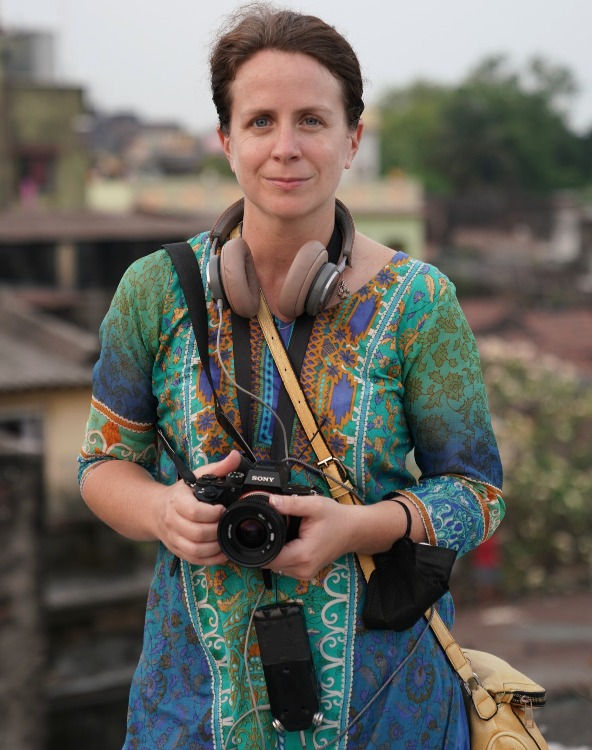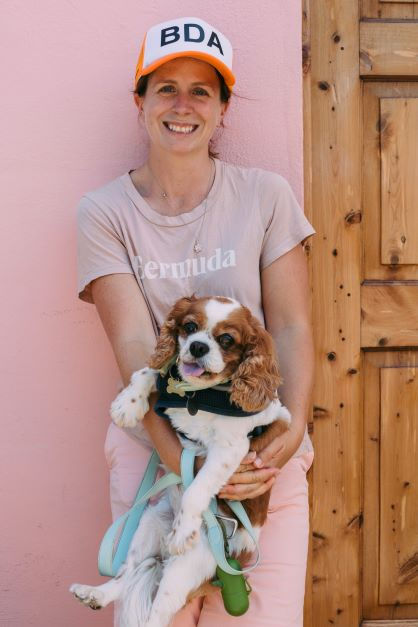From Filmmaker To Entrepreneur – Exclusive Interview With Lauren Anders Brown
- Brainz Magazine

- Jul 19, 2023
- 8 min read
Updated: Jul 20, 2023
Working on network television, commercials, and major motion pictures made Lauren Anders Brown a talented filmmaker very early on in her working career. Some would say she had it all served to her on a silver platter or, in her case, a silver cup. Her father was the general manager of Silvercup Studios in New York since she could remember, and it proved to be the head start she needed to learn enough to become a self-shooting documentary filmmaker. She’s attended film festivals around the world with her films, one of them even screening at the highly regarded Festival du Cannes. Now she’s also begun building her first startup, all before she’s even turned forty.

Lauren Anders Brown, Humanitarian Documentary Director
What was it like growing up around a film stage? Well, for starters instead of making childhood forts out of pillows and blankets, I made mine out of sandbags, c-stands, heavy blackout fabic, and any rope or gaffers tape I could find lying around. When you skip life milestones like learning how to make do with domestic materials, you grow up quite quickly. One of the first cameras I sat on belonged to Barry Sonnifeld.
Walking the dressing room hallways, I’d overheard voices of familiar characters like Mufasa (or Darth Vadar, whichever James Earl Jones character you prefer). And for fun, I would hide in a rolling hardshell case usually reserved for an 18k or 20k light and ride in the ‘freight only’ elevator to be rolled out onto a set where I would pop out of the top feeling like I fooled everyone. It was movie magic. When did you know you wanted to be a filmmaker? Despite my father’s best efforts to deter me from the long, grueling hours of production life I became fascinated with cameras as a young teenager. He helped me build a dark room in my house and brought home lights and some of those very same c-stands I used to make forts out of so I could practice studio lighting. He was my biggest supporter in finding people in the industry willing to take me on internships as a teenager. After being a production assistant for years before my twenties I began begging camera departments to teach me more. If interning on my college breaks wasn’t enough for me, I set up my own exchange for a semester at the University of Southern California. I was one of the few people who could already load film in my class, and the only one who embarrassingly had studio execs introduce themselves to me on class trips because my Dad had called ahead to let them know I’d be visiting the lots. I graduated college entering the International Cinematographer’s Guild and a double degree of Bachelor of Arts and Bachelor of Science from the University of Massachusetts, Amherst.
Neither degree was exclusively in film but that was intentional having been groomed knowing the grueling nature of filmmaking and that it might not be what I work in forever which is precisely what has come to pass.
What was your first big industry break? I’d have to begin with my time interning for the cinematographer Harris Savides, ASC. He was one of the first men I met in the industry that proved you could be incredibly talented and kind. This was at a time when much has been uncovered recently as to the discrimination and treatment of women in the film industry. Being the daughter of a studio manager did not make me immune to gender bias and harassing treatment, but thankfully I was lucky to first be taken under the wing of someone like Harris who not only valued my enthusiasm but treated me no differently to the men (often much older than me) on the set. He’s the reason I got into the International Cinematographer’s Guild and for that, I will be forever grateful. My first big break though was working on Ugly Betty. The hours were long, but the cast was fantastic and the crew felt like family. I can say despite working on some other pretty incredible shows since then like House of Cards and The Blacklist, I still struggle to say there’s a better show I’ve worked on than Ugly Betty. It bought me to some pretty incredible locations, some of which have actually played out further along in my life and career - starting with the United Nations. The first time I ever went into the UN was for an episode we were filming a fashion show taking place in the Security Council with clothing made of mosquito netting. I can say that although it looked good on camera, I’ve never seen that concept carried out in any of the initiatives I’ve witnessed while working with the UN since then. When did you know you wanted to become a humanitarian and make documentaries? That’s a two-part question. I became a humanitarian on the day of 9/11. I was in high school about 10 miles away from ground zero when it happened, I walked into my history class and my teacher was sobbing at the computer unable to get any further information, and made me continue to scroll. I didn’t lose anyone personally that day, but I felt the loss and it made me want to help others in any way I could. It would take close to a decade before I would go on a trip to South Africa for the World Cup in 2010. I never expected to go to Africa in my lifetime, nevertheless a world cup. But there I was, surrounded by people who were warm, welcoming and had lived through a lot within living history. I initially became inspired by how the sport brought people together for this event, and couldn’t let go of the idea that I wanted others to share that experience. So instead, what I call my ‘Master'sDegree’ came in the form of financing and producing my own documentary mini-series. I went around the world to 11 different countries leading up to the next world cup in Brazil and filmed stories of how football created social change in different ways. It was called The World Cup Project.

What work have you done since then?
I immediately transitioned from filming sports to health-related topics, with my first documentary job filming at a hospital in rural Haiti. I was then asked by Dr. Atul Gawande’s charity LifeBox to film my first long-format documentary on global surgery, given my recent background in location filming and being a self-shooting director. That film was my first award-winning documentary called The Checklist Effect, based on Dr. Atul Gawande’s book. After that first documentary, I managed to work my way back into the United Nations and make some connections with UNFPA. I have been working with UNFPA, the sexual and reproductive health agency for seven years filming and editing to highlight their work in the field in Jordan, Bangladesh, Haiti, Liberia, Mozambique, South Africa, Morocco, Ecuador, and South Sudan. I also directed and produced three films in collaboration with UNFPA that attended festivals like the Cannes Film Festival and won several awards: Six Year Old Fears, Shanti Khana, and WOMENstruate. My latest film, FORGED, recently won two Telly Awards.
Do you know how many countries have you been to? My current country count is 87, and I’ve filmed/photographed about half that number. So you like to travel? I enjoy exploring new places, cultures, foods, and languages. Seeing beautiful landscapes and meeting interesting people I’d otherwise not. But I actually don’t enjoy the end-to-end process of traveling, even though I am really good at the logistics of it. You don’t get to 87 countries in 38 years without a lot of planning.

Is that what has inspired you to pivot your work to build your new startup PadsPass? For the last couple of years, more specifically the last three years life has looked different for us all. In 2019 I was jumping on a plane every other week for work to go and film an important topic that needed to be addressed and as rewarding as that was it was exhausting and unsustainable not just for the planet but for myself. I knew in 2019, life would need to change for me, but I never anticipated that change to be in the form of a global pandemic. But so it was, and I had no other skills other than editing that would allow me to be useful at the time or earn a living. It made me realise how specialised my skillset was, and how I desperately needed to upskill. I did some of the things others did during the pandemic, like learning a new language and my Arabic lessons have paid off quite literally.
About a year and a half ago, I was approached by my friend to begin giving some of my time to his startup Gamoteca as their Creative Director. I wasn’t sure I was startup material but over time the flexibility and independence have mirrored that of my career as a filmmaker and my upskilling paid off by managing my first project for them in Arabic. Being bit by the startup bug, ideas began generating of how I could make my travel experience easier which primarily rested on making my dog’s travel experience easier. For my dog’s 12-year life, we traveled to as many places as we could logistically manage, which resulted in 9 countries 75 flights, and a lot of paperwork. In her last year, two incidents happened that were the result of human error that made me realise there has to be a better way, and I can’t be the only one who equally loves travel as much as their dog.
Tell us about your startup.
PadsPass is a digital pet passport that syncs your travel schedule, airline and government requirements with your pet’s personal medical information. It keeps you on track ahead of travel by submitting prepared paperwork and guides you in transit to ensure a pleasant pet-parent experience. We have a website and are on Instagram, Facebook, and LinkedIn and I would recommend following any of those or signing up for the newsletter for (p)updates.
And where is your first port of call for your startup?
The first route we’ll focus on is between USA and Bermuda. It’s the place I’ve been residing for the past three years and as an American, I know the usual thought process is that islands are too strict to travel with dogs. But Bermuda is different, the process is straightforward and painless enough to be an excellent Beta Test for PadsPass with several commercial and private airlines offering options for pet travel. PadsPass will show you what options are available for your dog and how to begin booking your pawliday to the pink sand beaches of Bermuda.
What happens after this startup will you continue to be bit by the startup bug or go back to filming in the field?
I know I’ll forever be a filmmaker, a storyteller, and a humanitarian. A part of me even feels like the work I’m doing with PadsPass helping humans travel with their furry loved ones is a bit humanitarian – because dogs make humans better humans. I’ve learned most people who make startups find themselves in two camps: either they always wanted to live the startup life, or they really had a need for a service or product and found the only way they could get it was to make it themselves. I find myself in the latter group, so unless I find another big issue I need to create something myself to solve, I’ll probably find myself back behind a camera again working to share the stories of others.









